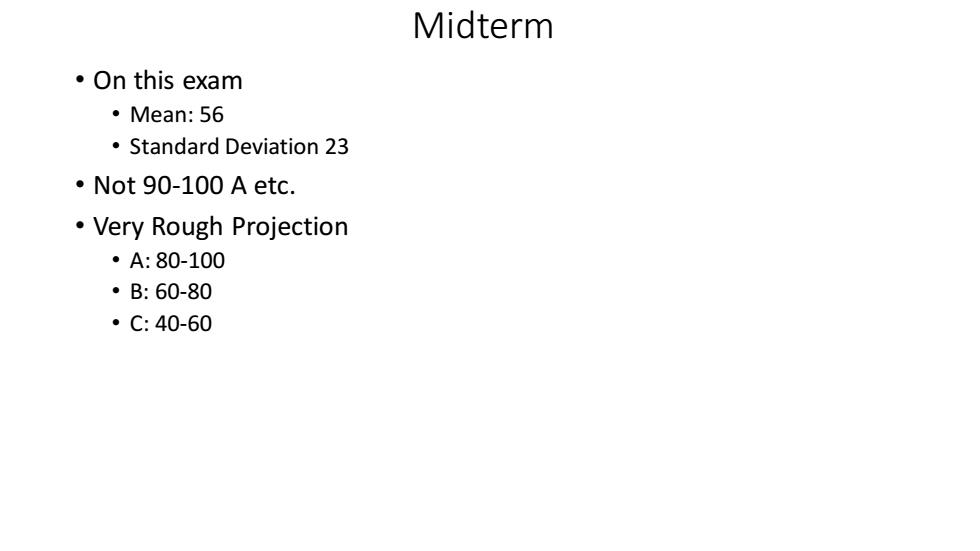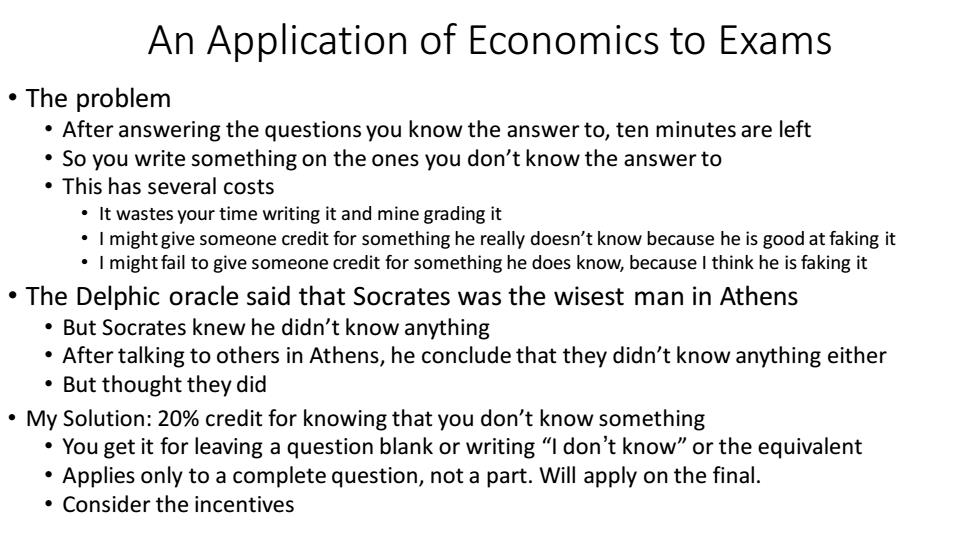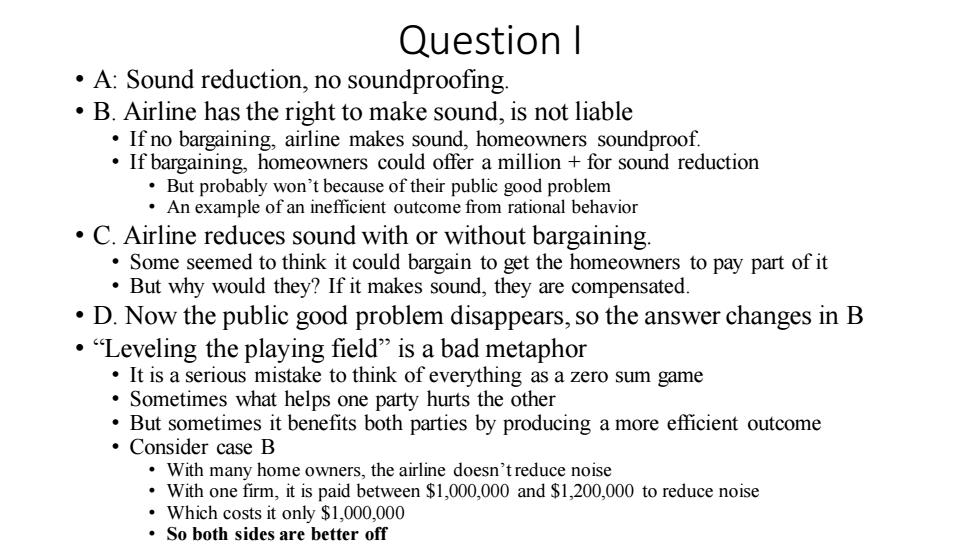
Midterm ·On this exam ·Mean:56 Standard Deviation 23 ·Not90-100Aetc. Very Rough Projection ·A:80-100 ·B:60-80 ·C:40-60
Midterm • On this exam • Mean: 56 • Standard Deviation 23 • Not 90-100 A etc. • Very Rough Projection • A: 80-100 • B: 60-80 • C: 40-60

An Application of Economics to Exams 。The problem After answering the questions you know the answer to,ten minutes are left So you write something on the ones you don't know the answer to This has several costs It wastes your time writing it and mine grading it I might give someone credit for something he really doesn't know because he is good at faking it I might fail to give someone credit for something he does know,because I think he is faking it The Delphic oracle said that Socrates was the wisest man in Athens But Socrates knew he didn't know anything After talking to others in Athens,he conclude that they didn't know anything either ·But thought they did My Solution:20%credit for knowing that you don't know something You get it for leaving a question blank or writing "I don't know"or the equivalent Applies only to a complete question,not a part.Will apply on the final. Consider the incentives
An Application of Economics to Exams • The problem • After answering the questions you know the answer to, ten minutes are left • So you write something on the ones you don’t know the answer to • This has several costs • It wastes your time writing it and mine grading it • I might give someone credit for something he really doesn’t know because he is good at faking it • I might fail to give someone credit for something he does know, because I think he is faking it • The Delphic oracle said that Socrates was the wisest man in Athens • But Socrates knew he didn’t know anything • After talking to others in Athens, he conclude that they didn’t know anything either • But thought they did • My Solution: 20% credit for knowing that you don’t know something • You get it for leaving a question blank or writing “I don’t know” or the equivalent • Applies only to a complete question, not a part. Will apply on the final. • Consider the incentives

Some General Issues on this Exam Talking about the subject instead of answering the question. When I cross stuff out it doesn't mean it is wrong It means it is irrelevant to the question Confusing what is efficient with what will happen or what is in the individual's interest An important mistake,since a central problem Is how to prevent situations where what happens is not efficient For example problem I B The airline does not control noise Which is not the efficient solution But is the solution that results from each party acting in his own interest
Some General Issues on this Exam • Talking about the subject instead of answering the question. • When I cross stuff out it doesn’t mean it is wrong • It means it is irrelevant to the question • Confusing what is efficient with what will happen or what is in the individual’s interest • An important mistake, since a central problem • Is how to prevent situations where what happens is not efficient • For example problem I B • The airline does not control noise • Which is not the efficient solution • But is the solution that results from each party acting in his own interest

Question I A:Sound reduction,no soundproofing. B.Airline has the right to make sound,is not liable If no bargaining,airline makes sound,homeowners soundproof. If bargaining,homeowners could offer a million for sound reduction But probably won't because of their public good problem An example of an inefficient outcome from rational behavior C.Airline reduces sound with or without bargaining. Some seemed to think it could bargain to get the homeowners to pay part of it But why would they?If it makes sound,they are compensated. D.Now the public good problem disappears,so the answer changes in B ."Leveling the playing field"is a bad metaphor It is a serious mistake to think of everything as a zero sum game Sometimes what helps one party hurts the other But sometimes it benefits both parties by producing a more efficient outcome ·Consider case B With many home owners,the airline doesn'treduce noise With one firm,it is paid between $1,000,000 and $1,200,000 to reduce noise Which costs it only $1,000,000 So both sides are better off
Question I • A: Sound reduction, no soundproofing. • B. Airline has the right to make sound, is not liable • If no bargaining, airline makes sound, homeowners soundproof. • If bargaining, homeowners could offer a million + for sound reduction • But probably won’t because of their public good problem • An example of an inefficient outcome from rational behavior • C. Airline reduces sound with or without bargaining. • Some seemed to think it could bargain to get the homeowners to pay part of it • But why would they? If it makes sound, they are compensated. • D. Now the public good problem disappears, so the answer changes in B • “Leveling the playing field” is a bad metaphor • It is a serious mistake to think of everything as a zero sum game • Sometimes what helps one party hurts the other • But sometimes it benefits both parties by producing a more efficient outcome • Consider case B • With many home owners, the airline doesn’t reduce noise • With one firm, it is paid between $1,000,000 and $1,200,000 to reduce noise • Which costs it only $1,000,000 • So both sides are better off

If Everything is Zero Sum Whatever helps me must hurt you So all disagreements are about Which of us gets the goodies Examples of the mistake If China gets richer,we are less competitive,which is bad If the rich get richer the poor must get poorer All political disagreements are about which side you are on rich or poor,black or white,Americans or foreigners So Republicans and Democrats are enemies And all is fair in love and war Husbands and wives are enemies too Consider implications of the belief In settlement negotiations In trade negotiations In interpersonal relations A very dangerous mistake
If Everything is Zero Sum • Whatever helps me must hurt you • So all disagreements are about • Which of us gets the goodies • Examples of the mistake • If China gets richer, we are less competitive, which is bad • If the rich get richer the poor must get poorer • All political disagreements are about which side you are on • rich or poor, black or white, Americans or foreigners • So Republicans and Democrats are enemies • And all is fair in love and war • Husbands and wives are enemies too • Consider implications of the belief • In settlement negotiations • In trade negotiations • In interpersonal relations • A very dangerous mistake